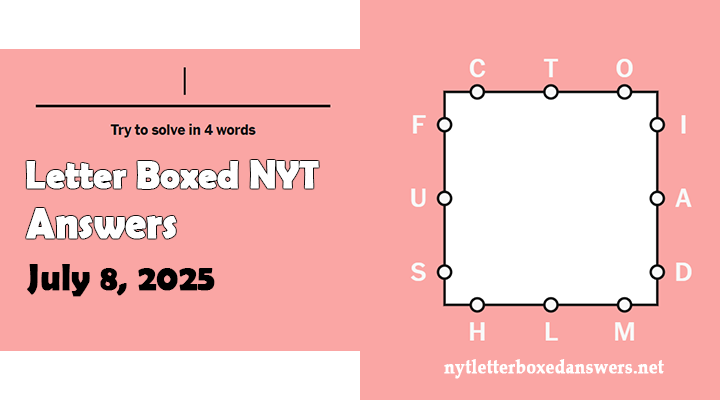NYT Letter Boxed quiz for Tuesday July 8, 2025 is released. We came up with Letter Boxed July 8 2025 Answers and Hints for you. With the help of these hints, you will be able to guess the words of letter boxed quiz without revealing the answers and get the solution.
| Top | Right | Bottom | Left |
|---|---|---|---|
| CTO | IAD | HLM | FUS |
| Two Words Solution | ||
|---|---|---|
| FISCAL | LOUDMOUTH | |
| FISCAL | LOUDMOUTHS | |
| FOLDOUT | SCHISMATIC | |
| FOLDOUTS | SCHISMATICS | |
| Three Words Solution | ||
|---|---|---|
| AFLOAT | THUD | DOMICILS |
| AFLOAT | THUDS | SOMATIC |

Word 01:
This 6-letter word starts with F and ends with L; relating to government revenue, taxes, or public finances.
Commonly paired with policy, year, or responsibility.
Refers to budgeting, spending, and economic management.
Often used in contrast to monetary policy.
Comes from Latin fiscus, meaning treasury.
Used in accounting and macroeconomics.
May describe national debt or deficit matters.
A key term in audits and financial reports.
Appears in phrases like “fiscal crisis” or “fiscal discipline.”
Central to government planning and resource allocation.
Word 02:
This 9-letter word starts with L and ends with H; describes someone who talks too much, often rudely or obnoxiously.
Implies brashness, arrogance, or lack of discretion.
Often used insultingly in social or political contexts.
Synonym of blowhard, bigmouth, or boaster.
May refer to one who dominates conversations.
Found in arguments, rallies, or locker rooms.
Associated with speaking out of turn or volume.
Can be humorous or critical in tone.
Appears in media critiques or pop culture jabs.
A person who’s always heard before they’re seen.
Word 01:
This 6-letter word starts with F and ends with L; relating to government revenue, taxes, or public finances.
Commonly paired with policy, year, or responsibility.
Refers to budgeting, spending, and economic management.
Often used in contrast to monetary policy.
Comes from Latin fiscus, meaning treasury.
Used in accounting and macroeconomics.
May describe national debt or deficit matters.
A key term in audits and financial reports.
Appears in phrases like “fiscal crisis” or “fiscal discipline.”
Central to government planning and resource allocation.
Word 02:
This 10-letter word starts with L and ends with S; plural of a term for people who talk loudly or offensively.
Describes a group of brash or boastful individuals.
Suggests a noisy, disruptive presence.
Often used when discussing debates or protests.
Used pejoratively in opinion columns or comedy.
Contrasts with soft-spoken or respectful types.
May incite conflict or dominate discussions.
Sometimes satirized in cartoons or sitcoms.
Can imply immaturity or poor social awareness.
Think of hecklers, ranters, or radio show callers.
Word 01:
This 7-letter word starts with F and ends with T; a section or panel designed to expand or unfold.
Common in books, brochures, or furniture.
May contain maps, diagrams, or hidden text.
Can refer to convertible beds or seats.
Used in product packaging or marketing materials.
Adds visual or functional extension to form.
Often reveals content too large for a single page.
Enhances reader experience or usability.
Popular in children’s books or travel guides.
Combines the verbs “fold” and “out.”
Word 02:
This 10-letter word starts with S and ends with C; someone who promotes division, especially in religion or ideology.
Derived from “schism,” meaning a formal split.
Often used in theological or political contexts.
May describe rebels or sectarian thinkers.
Considered disruptive by mainstream institutions.
Accused of causing disunity or heresy.
Appears in church history and reformation texts.
Associated with doctrine-related conflict.
Can be both noun and adjective.
From Greek schisma, meaning “cleft” or “division.”
Word 01:
This 8-letter word starts with F and ends with S; plural of an item or panel that unfolds.
Found in atlases, manuals, and promotional flyers.
Useful for displaying detailed or oversized content.
Common in printed media and packaging design.
Often include schematics, timelines, or illustrations.
Enhances interactivity and presentation.
Popular in collector editions or educational materials.
Can be part of furniture (e.g., foldout couch).
Requires precision in layout and folding.
Designed for compact storage and easy access.
Word 02:
This 11-letter word starts with S and ends with S; plural of a person or group causing division within a unified body, especially in religion.
Describes those who oppose orthodox or official doctrines.
Historically used in church and doctrinal debates.
May include breakaway groups or sects.
Seen as threats to institutional unity.
Rooted in theological or political protest.
Sometimes viewed as heretics or revolutionaries.
May lead to permanent separations or reformations.
Used in canon law and ecclesiastical writings.
Typically framed negatively by ruling factions.
Word 01:
This 6-letter word starts with A and ends with T; describes something buoyant or on the water.
Also used metaphorically for surviving or active.
Opposite of sunk or grounded.
Applies to ships, debris, or finances.
Suggests motion and surface-level stability.
Common in nautical language and reports.
Can mean continuing to operate amid challenge.
Often paired with “keep” or “stay.”
Derived from Old English and Dutch roots.
Seen in idioms about survival or progress.
Word 02:
This 4-letter word starts with T and ends with D; a dull, heavy sound made by a falling object.
Associated with impact, force, or collapse.
Common in descriptive writing or comics.
May represent footsteps, books, or punches.
Can be literal or onomatopoeic.
Often signals finality or failure.
Sometimes mimics sound in war scenes or falls.
Can indicate unconsciousness or defeat.
Used in expressions like “hit with a thud.”
Simple, sensory, and sound-driven.
Word 03:
This 8-letter word starts with D and ends with S; plural of an older or formal term for places of residence.
Synonym of homes, dwellings, or abodes.
Used in legal, real estate, or tax contexts.
Refers to legal place of residence.
Not as common in modern everyday speech.
May appear in government or census language.
Derived from Latin domicilium.
Can imply permanent or habitual living quarters.
Tied to jurisdiction and legal domicile.
Useful in contracts or cross-border residency issues.
Word 01:
This 6-letter word starts with A and ends with T; describes something buoyant or on the water.
Also used metaphorically for surviving or active.
Opposite of sunk or grounded.
Applies to ships, debris, or finances.
Suggests motion and surface-level stability.
Common in nautical language and reports.
Can mean continuing to operate amid challenge.
Often paired with “keep” or “stay.”
Derived from Old English and Dutch roots.
Seen in idioms about survival or progress.
Word 02:
This 5-letter word starts with T and ends with S; repeated heavy or dull sounds, often from impact.
Plural of a noise caused by objects dropping or hitting.
Can be rhythmic or irregular, depending on context.
Describes ominous or disruptive background noise.
Often in fight scenes, horror, or suspense writing.
Suggests motion followed by abrupt stoppage.
Could describe boots, doors, or books.
Gives sensory depth to written scenes.
Can foreshadow danger or arrival.
Has auditory realism in sound design or fiction.
Word 03:
This 7-letter word starts with S and ends with C; relating to the body, especially as distinct from the mind.
Used in medicine, biology, and psychology.
Contrasts with mental or emotional conditions.
In genetics, refers to non-reproductive cells.
Can describe physical symptoms or treatments.
Originates from Greek sōma, meaning body.
Appears in phrases like “somatic therapy.”
Relevant in body-oriented healing practices.
Describes physical manifestations of stress.
Central in mind-body wellness discussions.

Chris Brown is a passionate word game love and problem solving expert. With over 15 years of experience in solving puzzle challenges, he provides daily NYT Letter Boxed answers, tips and strategies to help other players so that they can improve their solving skills. Whether you are stuck on a tricky puzzle or looking for new techniques, Chris is here to guide you with his expert solutions.